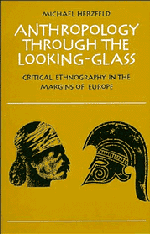Book contents
- Frontmatter
- Contents
- Preface
- Key to symbols
- 1 Romanticism and Hellenism: burdens of otherness
- 2 A secular cosmology
- 3 Aboriginal Europeans
- 4 Difference as identity
- 5 The double-headed eagle: self-knowledge and self-display
- 6 Strict definitions and bad habits
- 7 The practice of relativity
- 8 Etymologies of a discipline
- Notes
- Bibliography
- Index
3 - Aboriginal Europeans
Published online by Cambridge University Press: 11 March 2010
- Frontmatter
- Contents
- Preface
- Key to symbols
- 1 Romanticism and Hellenism: burdens of otherness
- 2 A secular cosmology
- 3 Aboriginal Europeans
- 4 Difference as identity
- 5 The double-headed eagle: self-knowledge and self-display
- 6 Strict definitions and bad habits
- 7 The practice of relativity
- 8 Etymologies of a discipline
- Notes
- Bibliography
- Index
Summary
Age-old Europe?
The image of fallen Hellenism separates a time of historical travail from a timeless past glory. As a tale of lost innocence, it reproduces both the corrupted Urtexte of the folklorists, and the grand mental schemata that structuralists discern behind the untidy accretions of conscious thought. The thesis of a Hellenism fallen from grace incorporates both the “holy” and the “polluted” visions of modern Greece. It portrays the aboriginal embodiment of the European ideal fallen to the evil corruption of anti– Europe. Like all such historicist visions, as we saw in the last chapter, it actually represents a present divested of time; the terms of the relevant symbolic opposition are eternity and history, not two phases of human development (see also Ardener 1971c:231–2). The supposedly historical loss of culture is transmuted into a synchronic lack of culture. But both perspectives, by treating the modern Greeks either as living ancestors or as wretched orientals, deny them the absolute essence of culture itself.
Literacy is the hallmark of culture conceived in these Eurocentric terms; and literacy confers effective power at many levels. Although rural Greeks satirize the literate, and regard them as deceivers of the poor, such attitudes are at base a grudging recognition of the power that literacy confers; they may also signal the emergence of a clear class differentiation (Meraklis 1984:73–4). In addition to illiteracy, nomadism and uncouthness are attributes of a stereotypical Turkishness that marks an absence of what enables a European to live, as Greeks say, “like a human being” (san anthropos); and these hackneyed traits legitimize the power of those who define the content of the national (or European) culture.
- Type
- Chapter
- Information
- Anthropology through the Looking-GlassCritical Ethnography in the Margins of Europe, pp. 49 - 76Publisher: Cambridge University PressPrint publication year: 1988



